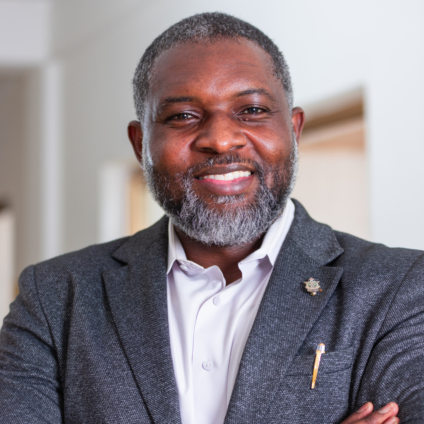
Audio By Carbonatix
Global health expert at the Kwame Nkrumah University of Science and Technology, Dr. John Amuasi explains how vaccines are a fundamental tool in reducing disease burden globally.
“We cannot over-emphasize the impact vaccines have had; it is simply amazing. The role that vaccines have played in reducing the global burden of disease is perhaps the single most potent tool to consider aside from basic public health interventions,” he said.
Dr Amuasi shared these thoughts at the FDA’s maiden Scientific Forum, which was convened on Thursday, September 14 in Accra.
The forum, themed: "Protecting Public Health and Safety Through Partnerships," brought together academics, manufacturers, research institutions, policymakers, and collaborators to discuss ways to enhance quality and safety of Ghana’s food and medical products.
Discussions revolved around partnering for success in local vaccine research, development, and production, and ensuring the quality and safety of food and medical products through effective collaboration.
Speaking on the topic “Global Health, Vaccine Research, and Breakthroughs”, Dr Amuasi, head of the Global Health Department at the School of Public Health, KNUST, spelled out the goal of Global Health in addressing inequity.
“There will always be some differences, but the degree to which these differences impact on the quality of health, life expectancy, sickness, and death is what is really important. Global Health is seeking to bridge this gap,” he said.
Dr Amuasi emphasized the importance of having an accurate measure of disease burden in order to better inform decision-making and resource allocation.
“These estimates are so important because they inform planning and decision-making. If the estimates are wrong, everything else is wrong. The proverbial Garbage In Garbage Out.
“Being able to measure accurately is so critical, especially when we are talking about vaccines and trying to understand what their impact is,” he said.
He continued: “The most significant impact of vaccines has been to prevent the morbidity and mortality from life-threatening infections.
“They are estimated to prevent almost six million deaths per year and save 386 million life years and 96 million disability-adjusted life years globally.”
Dr. Amuasi weighed in on the role of vaccines in the eradication of Smallpox and Rinderpest virus (in livestock), reducing the risk of antibiotic resistance, and in preventing cervical cancer via the Human papillomavirus (HPV) vaccine.
“I don’t understand why HPV is not a political issue. It is such a low-hanging fruit. The power that this vaccine has to kick out cervical cancer is amazing,” he stressed.
He went on to encourage all stakeholders, that as Ghana dives into the waters of vaccine manufacturing, it is not just about efficacy of the vaccine, but ultimately its effectiveness and impact.
He explained that these impacts influence non-health outcomes in the economic and social sectors.
“Being able to achieve vaccine effectiveness and impact is beyond just having the vaccine. It is the understanding of the “WHY”; Why would people take or refuse a vaccine?
Using COVID-19 as a blanket, he pinpointed some challenges of vaccine acceptance within populations.
He pulled up a survey he was involved in conducting that revealed that 60.9% of participants were against receiving the COVID-19 vaccination because they were unsure of its clinical safety. Indicating the need to address misinformation and conspiracy theories among the public.
To conclude his address, Dr. John Amuasi shared a concept coined by his research group, The Global Health and Infectious Disease Research Group at the Kumasi Centre for Collaborative Research in Tropical Medicine: “The Golden Space”.
“There is a need for research as an integral component of Healthcare. If we can create this “Golden Space” between healthcare delivery and research, it is going to be a big game changer.
In addition to parallel panel discussions and poster presentations to the hybrid audience, the event included keynote addresses from the special guest of honour, Hon. Kwaku Agyeman Manu, the Minister of Health, and Prof. Rita Dickson, the Vice-Chancellor of KNUST.
The Minister of Health celebrated the FDA for its stellar contributions to universal health coverage.
“The FDA has achieved these feats due to robust regulatory systems developed over years leveraging expertise, resources, and best practices of its partners and collaborators.
“This scientific forum is an additional feather in the cap of the FDA as it engages stakeholders in its pursuit of regulatory excellence,” he said.
The event was made possible by the FDA’s partnering organizations: GIT, USAID, WHO, Pharmanova, and Atlantic Lifescience.
Latest Stories
-
Ghana is rising again – Mahama declares
5 hours -
Firefighters subdue blaze at Accra’s Tudu, officials warn of busy fire season ahead
5 hours -
New Year’s Luv FM Family Party in the park ends in grand style at Rattray park
5 hours -
Mahama targets digital schools, universal healthcare, and food self-sufficiency in 2026
5 hours -
Ghana’s global image boosted by our world-acclaimed reset agenda – Mahama
6 hours -
Full text: Mahama’s New Year message to the nation
6 hours -
The foundation is laid; now we accelerate and expand in 2026 – Mahama
6 hours -
There is no NPP, CPP nor NDC Ghana, only one Ghana – Mahama
6 hours -
Eduwatch praises education financing gains but warns delays, teacher gaps could derail reforms
6 hours -
Kusaal Wikimedians take local language online in 14-day digital campaign
7 hours -
Stop interfering in each other’s roles – Bole-Bamboi MP appeals to traditional rulers for peace
7 hours -
Playback: President Mahama addresses the nation in New Year message
8 hours -
Industrial and Commercial Workers’ Union call for strong work ethics, economic participation in 2026 new year message
10 hours -
Crossover Joy: Churches in Ghana welcome 2026 with fire and faith
10 hours -
Traffic chaos on Accra–Kumasi Highway leaves hundreds stranded as diversions gridlock
10 hours

